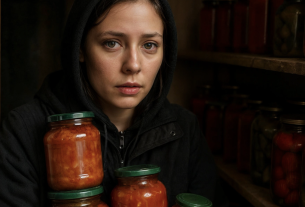“Olga, my dear, sit down! I’ve got news for you—a total bombshell!”
Stanislav burst into the apartment not like a person but like a force of nature—a gust of warm, noisy wind that smelled of exhaust fumes, success, and expensive cologne. He didn’t take off his coat; he flung it over the back of a chair. He didn’t set down his briefcase; he dropped it to the floor with the dull thud of costly leather. Rubbing his hands, he strode to the center of the living room, his face lit by that particular, almost childlike smile of someone bringing glad tidings and already savoring the universal delight to come. Olga, sitting in her corner of the sofa, slowly, almost reluctantly, lifted her gaze from the book. She said nothing, simply watched his fussy euphoria, and her stillness was as powerful a statement as his frantic gesturing.
“What bombshell now, Stas? Our home is never quiet as it is when you come back,” she said. Her voice was even, without the slightest inflection—just a statement of fact.
He brushed aside her words as something utterly insignificant, unworthy of his precious attention. He was too absorbed in the scale of his surprise.
“Not that! Nothing like that! Better! Remember I said my folks haven’t come by in ages? Well, it’s happening! Next week! All of them! Mom and Dad, and Aunt Vera with Uncle Kolya! Can you imagine? For a whole week! They’ve decided to spend their vacation with us, relax a bit. Said they’ve missed me unbearably. We’ll finally get together like the good old days! We’ll sit, we’ll talk, we’ll laugh till morning!”
He paced the room, sketching invisible pictures of universal happiness in the air. In his world, this was an almost sacred occasion—the clan reunited, a celebration of life, a display of unbreakable family bonds. He stopped, filled his lungs, and at last deigned to bestow on Olga a look full of condescending grandeur and unspoken but obvious instructions.
“Do your best, Olenka, all right?” he said in the tone used for matters not open to discussion. “Cook up a storm, the way you do. Mom just adores your meat roll. And, you know, the usual—some salads, appetizers. You’ll figure it out, you’re a real whiz. Housing them is no problem: the elders, of course, get our bedroom, the big bed. You and I will make do here on the sofa; we won’t fall apart. And Vera and Kolya—into your study. We’ll toss them the air mattress—they’re used to it. The main thing is that they feel at home and get a real rest.”
He fell silent, waiting for her reaction. He expected a happy nod, an approving smile, a stream of follow-up questions about his family’s favorite dishes. He expected her to jump right into the game called “the perfect hostess.” Olga said nothing. The silence lasted a few seconds longer than politeness allowed. Then, with a kind of ritual precision, she closed the book, set it on the coffee table, and raised her eyes to her husband. There was nothing in her gaze—no anger, no hurt, not even disappointment. Only a cold, crystal-clear emptiness.
“I never signed up to be a servant to your relatives, so you’ll be the one washing up after them and cooking for them when they arrive. I won’t touch a thing.”
The words fell into the room like blocks of ice. Not a flicker of emotion, not the slightest raise of her voice. It wasn’t a declaration of war so much as a reading of the terms of capitulation. His capitulation. The beaming smile on Stanislav’s face froze, then slowly began to melt, revealing confusion and then a twisted grimace of anger. Blood pounded in his temples.
“What…?” he rasped, unable to believe his ears. “What did you just say?”
“I said I will not perform the functions of service staff for your relatives. I’m not a cook, not a maid, and not an entertainment director. Is that clear enough?”
“So you don’t respect my parents?!” he exploded, snatching up his most reliable, time-tested trump card. “My old folks?! The aunt who changed my diapers?!”
“I respect them very much,” Olga replied with impeccable, icy politeness as she rose from the sofa. She straightened, and now she was the one looking down at him. “Precisely out of respect for their need for a comfortable rest, I’ve already booked myself a hotel room. Monday through Sunday. So as not to interfere in any way with your touching family reunion. You’ll have an entire week to show yourself, in full, as a hospitable, loving son and caring nephew. Good luck.”
For several seconds Stanislav simply stood there, processing what he’d heard. His mind, tuned for fanfares and fireworks, refused to handle this icy, lethal ultimatum. He stared at Olga as if she had suddenly begun to speak to him in an unknown alien tongue. Then the initial shock gave way to searing, crimson fury. This wasn’t just a quarrel. It was betrayal. Mutiny on his ship.
“Have you lost your mind?” he croaked, taking a step forward, his fists clenching of their own accord. “A hotel? What hotel, for God’s sake? You’re my wife! Your place is here, with my family! What am I supposed to tell them? That my wife ran away from home because my parents are coming? You want to disgrace me? Disgrace our whole family?”
He raised his voice, trying to pierce her calm with sound, pressure, authority. He was used to his volume being the decisive argument in their rare spats. But Olga didn’t even flinch. She looked at him the way an entomologist looks at an insect squirming under glass—with a cold, detached interest.
“What’s there to be ashamed of, Stas?” Her voice stayed just as even. “You invited your relatives. You’ll be the one to host them. What do I have to do with it? Or did you forget their last visit? Two years ago, for your birthday.”
She paused, giving him time to remember. But he didn’t want to remember. He wanted to attack.
“It was a wonderful birthday! The whole family together! What’s wrong with you this time?”
“What’s wrong is that after that ‘wonderful birthday’ I had to throw out the new living-room rug because your Uncle Kolya decided red wine makes a great addition to pale pile. What’s wrong is that your mother, after tasting that very meat roll she supposedly adores, spent half the evening telling Aunt Vera what an incompetent housekeeper I am and how the meat should have been soaked in milk, not cream. I heard everything, Stas.”
Each of her words was a small, sharp stone hurled at his rosy picture of family idyll. He winced as if from a toothache.
“Petty things! Nitpicking! So some wine got spilled—happens to anyone. So Mom said something… She’s old; it’s how she is! She wishes you well; she wants to teach you! And you take everything as an attack! You’ve got no generosity of spirit, Olya! Not a drop!”
“Generosity of spirit?” She tilted her head slightly; for a moment, something like a smirk flickered in her eyes. “Fine, let’s talk about breadth. Remember our microwave? The good, expensive one I spent three weeks choosing? It’s gone. Because your little brother—Aunt Vera’s darling boy—decided to check whether there would be sparks if he stuck a fork inside and turned on ‘grill.’ There were sparks. And there’s no microwave. Is that also a manifestation of generosity I was supposed to accept with a smile?”
Stanislav completely lost his rhythm. He wanted to talk high ideals—family, duty, respect—and she, methodically, like a bookkeeper, was reading him the invoice for damages. He felt his position weaken with each of her sentences.
“He’s a child! He didn’t mean it! We bought a new one!”
“We bought a cheap replacement because ‘no sense spending money; someone will break something again anyway,’” she quoted his own words from two years ago. “And it isn’t about the money, Stas. It’s about the fact that after your ‘family in full’ I spend two weeks washing, scrubbing, and repairing everything. I work five days a week, just like you. Yet when your relatives arrive, my week off turns into a round-the-clock shift as domestic help. And yours turns into a festival of life. So this time I’m choosing a festival, too. I’ve earned my rest. And you, as head of the family, have earned the right to take care of your loved ones. Yourself. From start to finish.”
Olga left Monday morning. There were no farewell speeches. She simply took a small bag, wordlessly hailed a taxi by the building, and vanished, leaving behind a ringing, unfamiliar quiet and the faint trace of her perfume. Stanislav prowled from room to room like a tiger in a cage, full of righteous anger and anticipation of imminent triumph. He would prove her wrong. He would show what a real, close-knit family looks like. He would throw such a reception she’d be ashamed of her selfishness and pettiness.
The relatives arrived on Tuesday, close to noon. Their arrival was like a beach landing. The doorbell didn’t just ring—it wailed in a long, insistent trill. The moment Stanislav opened the door, the entryway filled with noise, bustle, and the smells of a train, homemade pies, and Uncle Kolya’s strong tobacco. Suitcases, duffels, and string bags bursting with country goodies spread through the corridor like metastases, instantly seizing the living space.
“Stasik, darling! At last! And where’s our hostess, where’s Olenka?” his mother cried, crushing him in a hug, her fingers digging into his shoulders.
“She… had to leave urgently. For work,” Stanislav managed, feeling his ears heat. The lie came out clumsy and pathetic. “An important project, they let her go just for a couple of days.”
“What a nuisance,” Aunt Vera pursed her lips, inspecting the living room with a proprietary air. “We thought she’d treat us to her rolls. Well, never mind—work is work.”
The first evening was the first circle of his personal hell. Coming home from work, he found the apartment in a state of mild devastation. His parents’ coats hung over the wardrobe door, his uncle’s shoes stood in the middle of the hallway, and on his favorite sofa his father lay snoring loudly, head propped on Olga’s decorative pillow, a line of drool running onto it. The whole clan was waiting for dinner. Panicking about what to cook for five, Stanislav dashed to the store. He came back with bags full of dumplings, sausage, and a plastic tub of store-bought Olivier salad.
“Well then, bachelor style,” Mom sighed, poking a dumpling with her fork. “It’s fine, son, we’re simple folk. Though, of course, Olenka could have taken care to cook ahead if she knew she was leaving.”
By Wednesday the illusion of a family holiday had begun to crack. Stanislav realized his relatives hadn’t come to visit. They’d come to a sanatorium, and he was the only employee—cook, waiter, cleaner, and activities coordinator in one. In the morning they didn’t wake him with an alarm but with a demand: “Stasik, you’re out of coffee!” During the day they called him at work: “Stas, the remote won’t work—will you take a look when you get back?” In the evening, after he dragged himself through cooking, clearing the table, and washing a mountain of dishes, an interrogation awaited him.
“I don’t like this ‘work’ of hers,” Mom said thoughtfully when the two of them were alone in the kitchen. Uncle and Father were watching a soccer match on TV, and Aunt Vera was taking a bath, lavishly pouring out Olga’s lavender shower gel. “I’ll never believe someone just ups and leaves in a day. You two fought, didn’t you? She left because of us?”
“Mom, enough,” Stanislav waved her off wearily, wiping the table.
“I won’t! I’m your mother; I feel it in my heart! Your wife is high-and-mighty, I always saw that. She doesn’t like our simple folk. Nothing suits her, everything’s wrong. Are you a man or not? Put her in her place! She needs to know that a husband’s family is sacred! What is this otherwise? We come, and she wags her tail and dives into the bushes. That’s not right, Stas. Not right at all.”
He kept silent. What could he say? That she was right? That this “celebration” he’d anticipated turned out to be grueling, thankless work? That he already hated the shuffle of slippers across the parquet and the question “So what’s for dinner tonight?” For the first time in his life, he understood why Olga met the news of his family’s visits with such cold dread. He stared at the greasy stains Uncle Kolya had left on the clean tablecloth, listened to the bathwater running, and felt a dull, helpless rage boiling up inside. And that rage wasn’t aimed at his relatives. It was aimed at the woman now sitting in her country hotel, Pine Grove, reading a book—and being absolutely, humiliatingly right.
By Friday, Stanislav was a shadow of himself. He existed in a sticky, stifling fog of sleep deprivation, the smell of yesterday’s cutlets, and a low, constant irritation. The apartment, once his fortress, had turned into a branch of a train station—noisy, uncomfortable, perpetually dirty. Uncle Kolya burned the armrest of Olga’s chair with a cigarette. Aunt Vera, deciding to “tidy up,” rearranged the books in the study by height rather than author, turning the library into chaos. His father constantly commented on his culinary attempts, comparing everything to how “Mother used to do it,” and his mother… his mother ran her own quiet, subversive campaign.
The last straw was the scorched rice. Juggling a call from work and his father’s demand to find his glasses—on which the old man was literally sitting—Stanislav simply forgot the pot on the stove. The sharp stink of burning filled the kitchen.
“Son, who cooks rice like that?” his mother said as she walked in, wrinkling her nose. “You have to rinse it seven times, in cold water. Then pour the water two fingers higher. I taught you. Your Olenka has completely ruined you; you’ve gone all to pieces.”
Something inside Stanislav didn’t snap—it broke, like a frayed rope finally giving way. He looked at the blackened bottom of the pot, at his mother’s smug face, and he didn’t see his family. He saw the cause of his humiliation. He tossed the sponge into the sink, tore the car keys from the hook, and left the apartment without a word, the baffled exclamations behind him fading as the door shut.
The drive to the country hotel was charged with angry, boiling energy. He wasn’t just driving—he was flying into battle. In his head flashed every humiliation of the week: the dirty dishes, the critical remarks, the endless requests, and the total lack of gratitude. And the culprit of this whole nightmare was her. Olga. Who had run off, left him alone on this battlefield, betrayed him. He was going to tell her everything. He would make her come back. He would take her home, plant her at the stove, and show everyone who was master in his house.
The lobby of the Pine Grove Hotel greeted him with quiet, coolness, and the scent of pine and freshly brewed coffee. The contrast with his stuffy, cluttered apartment was so stark he lost his bearings for a second. He found her at once. Olga sat in a deep armchair by a panoramic window overlooking the pine forest. She wore a simple light dress, her hair gathered in a loose knot. She looked rested, calm, serene. A cup of coffee sat on the side table; a book was in her hands.
He approached—tall, rumpled, red-eyed from sleeplessness, a greasy stain on his shirt. He was the embodiment of the chaos she had fled.
“Enjoying yourself?” His voice was hoarse and venomous.
Olga raised her eyes slowly. There was no surprise in them, no fear. Only the faintest shadow of annoyance at being interrupted.
“As you can see,” she said, and lowered her gaze to the page again.
The blatant contempt set him off.
“You’re going to pack your things right now and come home!” he hissed, leaning toward her. “This circus is over! You left me alone with them! Do you know what our apartment has turned into? Do you know what I’ve been through this week? I’m working like a dog, cooking, cleaning, and all I get back is reproach! Your place is there, at home! With the family!”
He spat it all out in one breath, braced for any reaction—screaming, arguing, excuses. But Olga stayed silent. She calmly closed the book, keeping a finger where she’d stopped. Then she took a sip of coffee, paused, and looked him straight in the eye. Her gaze was utterly cold, like a surgeon delivering a final diagnosis.
“That’s not my family, Stas. It’s yours. And you didn’t ‘go through’ something terrible. For one week you simply dipped into the life you were trying to plunge me into permanently. Didn’t like it? What a pity. Now imagine what it would be like for me.”
She paused again, allowing the words to soak into his boiling brain.
“And you’re wrong. My place isn’t there. And it’s no longer ‘our’ apartment. It’s your house. With your rules and your kin. That’s what you wanted, isn’t it? A real, big, close family. There it is—at your place. Waiting for you to come back and cook them something. So go. Go home, Stas. To your family. As for my vacation, it seems it just got extended. Indefinitely.”
With that, she opened her book again, deliberately found the line, and sank back into reading. He remained standing in the quiet, sun-drenched lobby—humiliated, shattered, and utterly alone in his so-called “family”…



